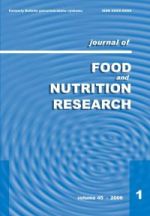Scientific journal
Journal of Food and Nutrition Research
Summary No. 1 / 2020
Duliński, R. – Starzyńska-Janiszewska, A.
Content and in vitro bioavailability of selected B vitamins and myo-inositol in spelt wheat (Triticum spelta L.) subjected to solid-state fermentation
Journal of Food and Nutrition Research, 59, 2020, No. 1, s. 1-6
Robert Duliński, Department of Biotechnology and General Technology of Food, Faculty of Food Technology, University of Agriculture in Kraków, ul. Balicka 122, 30-149 Kraków, Poland. E-mail: r.dulinski@ur.krakow.pl
Received 1 August 2019; 1st revised 30 October 2019; accepted 9 December 2019; published online 14 December 2019
Summary: This study examined the effects of tempe-type fermentation of spelt and green spelt grains with Rhizopus oligosporus on the content and in vitro bioavailability of
Keywords: Triticum spelta; solid state fermentation; B-group vitamins; myo-inositol; in vitro bioavailability
Download:
(pdf, 351.89 Kb, 1202x)









